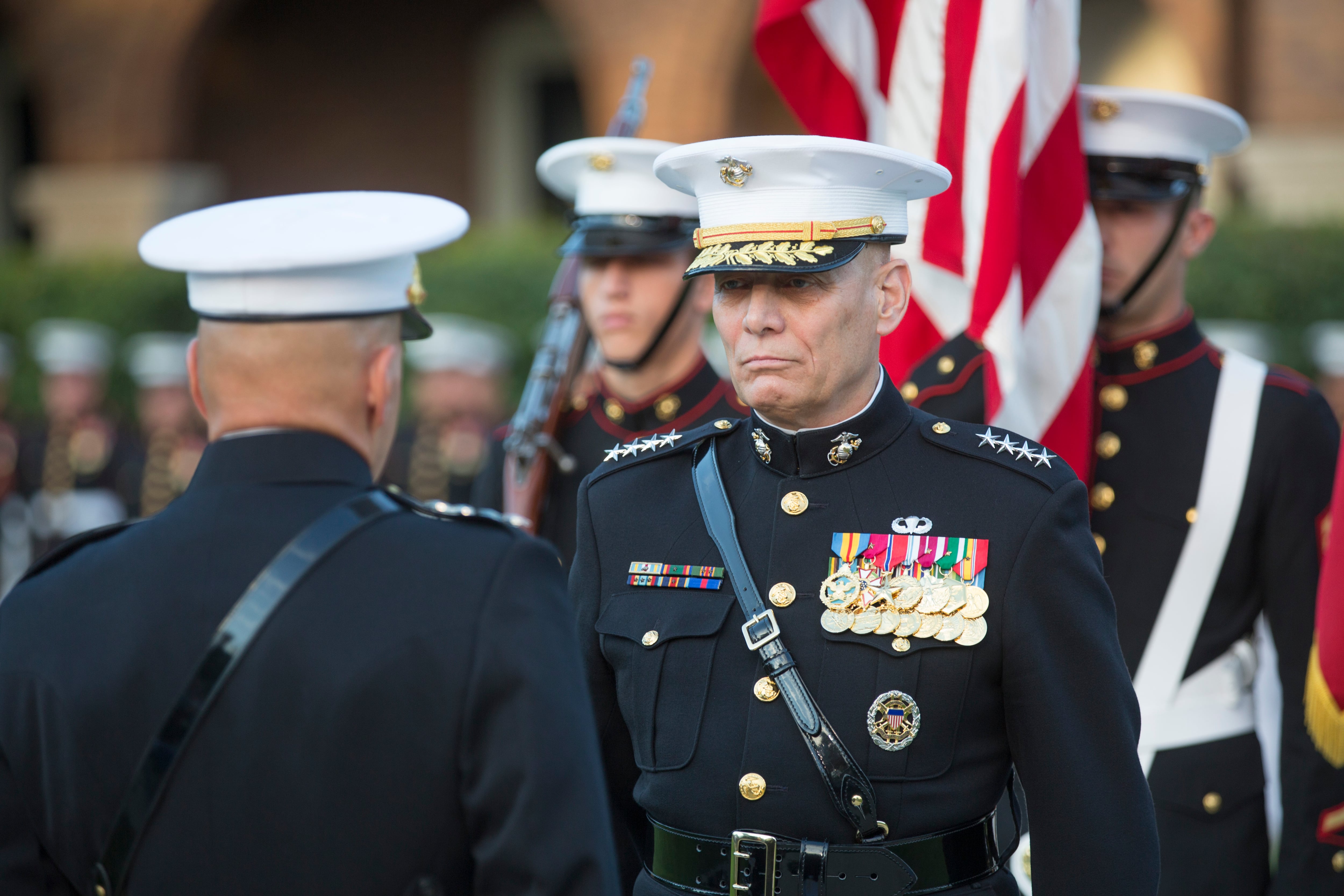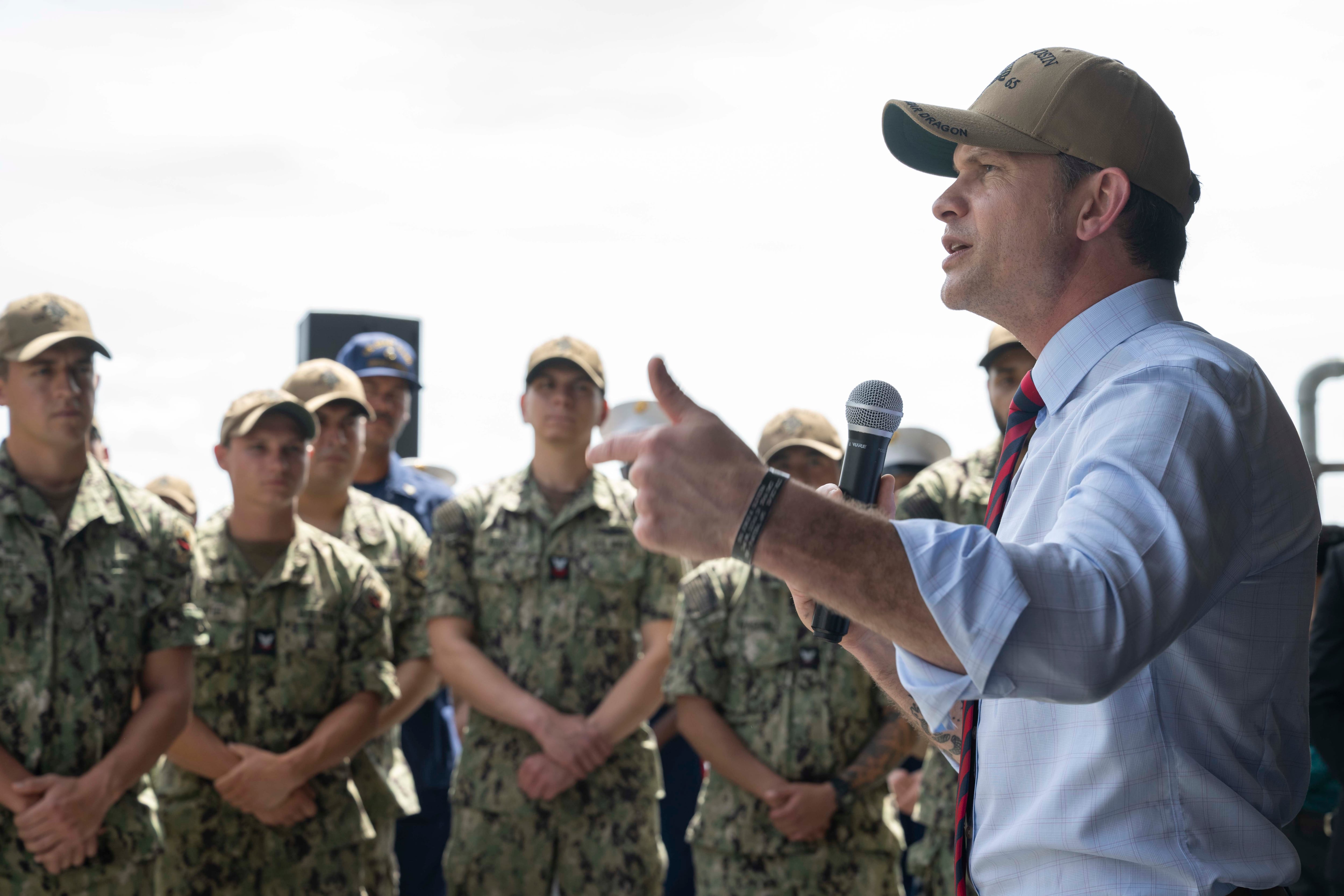Gen. John "Jay" Paxton Jr. is leaving the Marine Corps as the service is beginning to allow women into the infantry and other jobs to serve in jobs that during his decades in uniform had been restricted to men., only, such as infantry.
He frames the gender integration of combat units, which has been the source of much controversy, as a practical matter.
"This is not about women in uniform and it's not about women in combat," Paxton said. "The issue for us is … to make sure that the women who aspire to be in those [military occupational specialties] can perform the standard so that anyone in that unit — male or female — has no fear or misgiving that the performance of the mission and the accomplishment of the mission is going to be done, regardless of gender."
Paxton, who became assistant commandant in December 2012, is retiring next month after 42 years in the Marine Corps. In a wide-ranging interview with Marine Corps Times, he discussed the future of women in the Marines and other issues.
His advice to women who will serve in infantry units for the first time in the Marine Corps' history is the same he would give to any Marine: "Go in with the expectation and the commitment to do your best and with also the firm resolve to contribute to the unit and make sure the unit is mission ready and will succeed."
As the Marine Corps learned from its months-long gender-integration experiment, he said, the key to opening combat units to women is enforcing the same standard for men and women., he said.
"I think the Marines who happen to be women, who are going into those units, are committed to live up to that standard and contribute to unit efficiency and unit success," Paxton said.
But Paxton does not believe that the physical requirements that male and female Marines need to meet now should be etched in stone.
"The standards need to change; just as technologies; just as human abilities change; just as the way you can organize, train and equip teams change," Paxton said. "Our push to keep the standards as high as we can and to build the best units we can will serve us well in the future."
Paxton began his Marine Corps career as a temporary sergeant until he completed Officer Candidates School after graduating from Cornell University, where he played football. One hallmark of his leadership is making sure that officers set an example for enlisted Marines.
"The more senior you are in both grade and experience, the higher the expectation is that you will set the standards," Paxton said. "So as you grow in the Marine Corps, you're expected to make harder and harder decisions and to set a firmer and more clear example."
Retired Sgt. Maj. Gary Truscott served with Paxton at Marine Barracks Washington and with the 1st Marine Regiment at Camp Pendleton, California.
When young Marines saw lieutenants and captains at the Pendleton PX who were not wearing civilian clothing according to Marine Corps guidelines, they would call Truscott, who would march the officers up to Paxton's office.
"I go: Sir, I got this lieutenant; he doesn't think he needs to follow instructions and wear appropriate civilian attire. He thinks that's just for enlisted Marines," Truscott recalled.
"He goes: 'All right, send him in here.' He'd wear them out and then they'd leave the regimental area. That happened more than once."
Paxton knew when to discipline Marines and when to give them a second chance, said Truscott, who remembers a few noncommissioned officers whose careers Paxton saved, such as one Marine who was overweight but scored 297 on his Physical Fitness Test.
"They tried running him out of the Marine Corps and he [Paxton] wrote some heavy letters to Headquarters Marine Corps," Truscott said. "He did that on a couple of promotions too."

Gen. John Paxton Jr. faces Commandant Gen. Robert Neller during Paxton's retirement ceremony at the Marine Barracks Washington on Aug. 4.
Photo Credit: Alan Lessig/Staff
Throughout his career, Paxton has put his Marines first and foremost, and that includes helping them back up when they fall, said retired Gen. John Kelly.
"His reputation is one of a really caring leader: as a guy who knows how to discipline people without ruining their lives – and more importantly, how to lead them to do their jobs and serve the nation and, at the same time, grow as young people throughout their time of service until they are discharged and go off into the world and do great things as citizens," said Kelly, former head of U.S. Southern Command.
Paxton said he and most other Marines believe that people are key to the Marine Corps' success.
"Focusing on Marines, I've found it never leaves you high and dry," he said. "You always get the best mission result and the best unit cohesion just by taking care of people."
Another hallmark of Paxton's leadership style has been the trust he has invested in his enlisted leaders, said retired Sgt. Maj. Frank Pulley, who served with Paxton at Marine Corps Recruit Depot San Diego and then with the 1st Marine Division.
"He fully embraced the concept that the Marine Corps is made up predominantly of enlisted personnel and he treated the enlisted with utmost respect and regard and saw all the sergeants major and master gunnys and the staff NCOs as the keepers of tradition and the masters of Marine know-how," Pulley said.
Paxton said most Marine officers share his belief that is very important to trust noncommissioned and staff noncommissioned officers.
"They are the ones who are in daily contact with junior Marines," he said. "They're the ones who have the lifetime of experience. If you share the experiences with them, communicate what your expectations are, staff NCOs and NCOs will never let you down. They always rise to the occasion. They always do great things."
Then there are times when Marines are accused of doing something wrong, such as in January 2012, when a video surfaced showing scout snipers urinating on Taliban corpses. At the time, Paxton led II Marine Expeditionary Force, the scout snipers' parent command.
"My first assessment there is that those Marines were well screened, well trained, well led and went into the fight trying to do the right thing," Paxton said. "Every now and then, individuals do something that they wish, in hindsight, they would not have done and they wish they could go back."
Top Obama administration officials, including Navy Secretary Ray Mabus and then-Defense Secretary Leon Panetta and then-Secretary of State Hillary Clinton, condemned the Marines and vowed that those involved with the incident would be held fully accountable.
Marine Gen, James Amos, commandant at the time, ordered Paxton to put a hold on promotions for the scout snipers' entire battalion until Paxton could verify that none of the Marines had any part in the urination scandal. Ultimately, eight Marines were punished, including an officer who was involuntarily separated. Other Marines believe their careers were ended as a result.
Looking back, Paxton believes the Marine Corps was able to glean some lessons learned from the episode, he said.
"There's a right mix between what you do publicly, what you do privately, what you do quickly, what do you delayed and how you handle the ramifications of the issue," he said. "People can learn and people can bounce back. Sometimes we make things, perhaps, too quick when they should be slower -- or too public, when they should be private."
Retired Gen. James Mattis has known Paxton for more than 30 years, and he called Paxton one of the most competent yet humble Marine leaders he's known.
"He'll be remembered as one heck of a professional but one who kept his sense of humor and he kept his trust in the young guys," said Mattis, former head of U.S. Central Command. "He never lost faith; he never lost heart; he never took refuge in things that are bad or cynicism. That just wasn't his way. He always found a way to solve a problem."
Even though it was 42 years ago, Paxton clearly remembers how felt on the day he received his Eagle, Globe and Anchor. very well.
"It's a culmination of a dream: You know that you've passed muster; that you now have earned the opportunity to stand in ranks with predecessors who have gone before," he said. "But it's also a solemn and humbling moment because you realize that all you did was open the door.
"You've earned the right to be called a Marine, to be called a lieutenant, but you're starting the transition. You realize what a solemn obligation you have to those who went before to continue to learn, to continue lead, to continue to get better and to give back to the institution."





